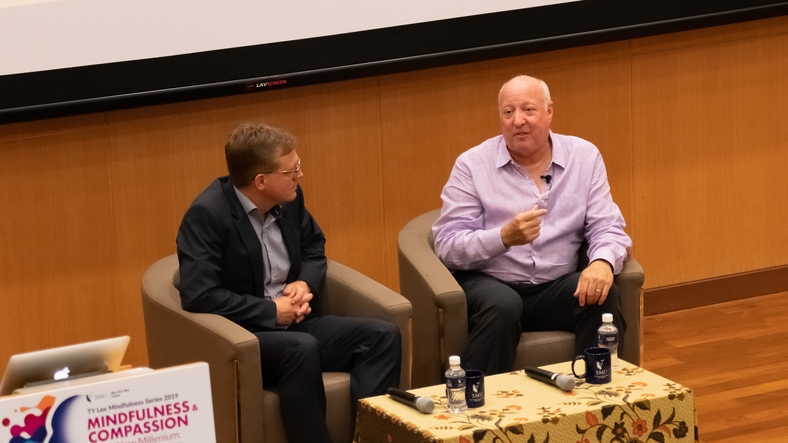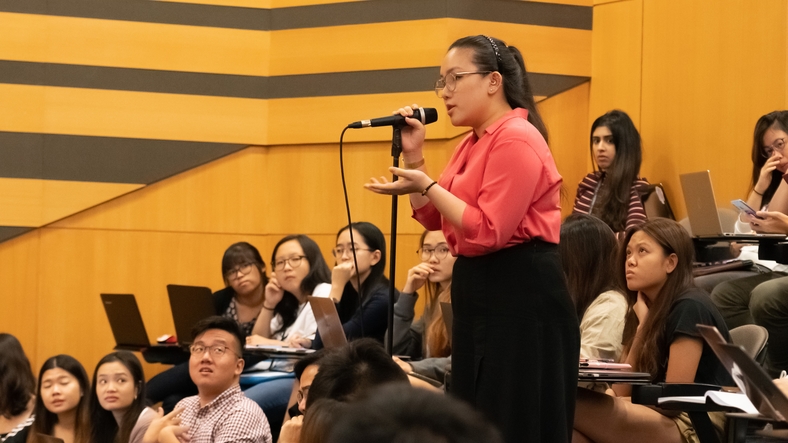Mindfulness for a more humane future

For the first TY Lee Mindfulness Distinguished Lecture Series 2019, distinguished psychologist Dr Steven Hickman explored the value and practice of mindfulness and how it can help to shape a happier future.
With rapid technological advancement and socio-political turmoil roiling the world today, it’s not surprising that a pervasive sense of isolation is on the rise. That probably explains why mindfulness has become the subject of increasing attention in recent years.
Mindfulness can be broadly defined as present-centred awareness and attention, and has long been a part of practices such as meditation. Today, individuals and organisations are embracing mindfulness as a way to reduce stress and anxiety.
Indeed, mindfulness might just be the key to finding our way back to what makes us human. Despite its name, the concept is not just about cerebral thinking. Mindfulness includes the heart, and views the human capacity for compassion as a way to heal, grow and make a positive impact.
The meaning of mindfulness was the subject of the first TY Lee Mindfulness Distinguished Lecture Series 2019. Organised by the Wee Kim Wee Centre and the Office of Core Curriculum, the event featured clinical psychologist Dr Steven Hickman, the founding director of the UC San Diego Center for Mindfulness. Here are some highlights from his talk, titled “Mindfulness and Compassion in the New Millennium: How Ancient Practices Can Meet Modern Challenges”.
Acknowledge and accept
When experiencing stress or suffering, dwelling on our negative emotions won’t change the situation. So the first step towards mindfulness is to be aware of our circumstances, then accepting the reality of the moment. In this way, we don’t put ourselves through unnecessary struggle by resisting things that cannot be changed.
Dr Hickman uses gravity as an analogy. “Gravity has negative effects. But how many people get up in the morning and complain about still being stuck to the earth? You don’t. You know it has negative effects, but you work with it because you accept the reality,” he says.
In a similar vein, we can acknowledge that feeling isolated is an inevitable by-product of our tech-driven lives. And instead of wrestling with this loneliness and feeling miserable, we can accept it and be at peace with it. Only then are we ready to take the next steps to do something about it, if we so choose.
Be kind to ourselves
Every airline safety announcement instructs passengers to put on their own oxygen mask in the event of an emergency, before helping others. The same principle holds true when it comes to mindfulness. We have to begin cultivating compassion for ourselves before we can impact the people around us.
As Dr Hickman puts it: “We’re all very good at taking care of our friends when they struggle and suffer and fail. We can always find a kind word, a civil gesture, a hug, or a cup of tea to comfort someone we care about who’s going through a hard time.”
But when we face difficulties in our own lives, “we beat ourselves up for the same things we would comfort someone else for experiencing. We have an epidemic of self-criticism in this world”, he points out. So focusing on compassion, not just for others but for ourselves. Only with inner joy and peace established can compassion for others flow.
Find purpose
Our inner critic can be like an overprotective parent who stops us from making new discoveries, innovating, or thinking out of the box. “There’s usually very little truth to our inner critic. Yes, it is trying to keep you safe by not standing out or taking a risk… but nothing big ever happens to someone thinking small,” says Dr Hickman.
Once we start silencing, or creating a distance from our inner critic, we can better identify and more objectively assess the global causes or challenges that we want to engage with. This will in turn make our lives more meaningful and purposeful.
Take charge
Mindfulness is made up of two complementary qualities, says Dr Hickman. One is compassion, the nurturing aspect of mindfulness. The other aspect is about taking action — something we need to do in order to protect and provide for ourselves or others.
A mindful leader, for example, can be kind and nurturing, and also stand up for his or her team. “Sometimes mindfulness means saying no, or stop. It means providing the things we need in the moment and motivating change or growth,” says Dr Hickman.
So think of mindfulness as the first step out of our comfort zone, towards a better understanding of the bigger picture, he suggests. When we recognise that we are all human and we all suffer, that realisation will bind us together and help us make a positive impact on the world.



